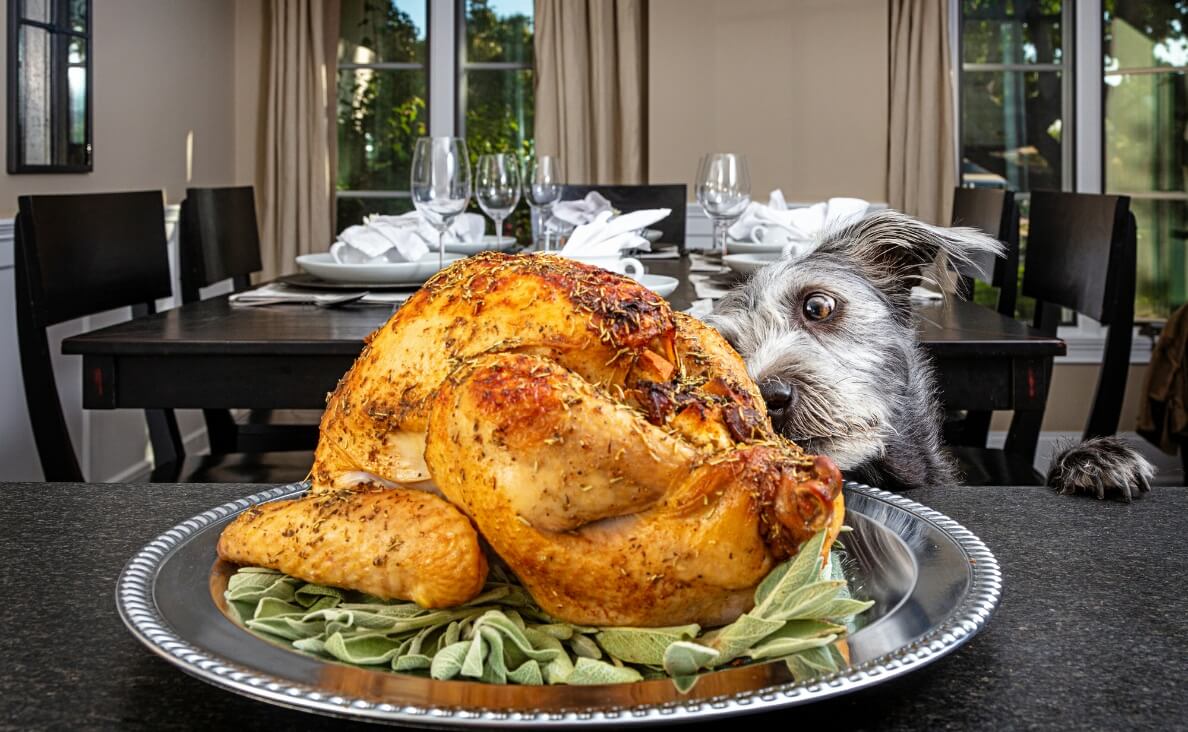
The holiday season is a time of joy and indulgence, but it’s also a time when our furry friends can risk developing an upset stomach. While we humans may savor the delicious and rich holiday foods, some of these can be harmful or even toxic to our dogs. In this blog post, we’ll explore some of the holiday foods that can cause your dog to have an upset stomach. It’s crucial to be aware of these potential dangers to keep your canine companion safe and healthy during the festivities.
-
Chocolate Delights
One of the most well-known holiday foods that can wreak havoc on your dog’s stomach is chocolate. During the holidays, we often find an abundance of chocolate treats such as truffles, cocoa-dusted almonds, and chocolate bars. Chocolate contains theobromine and caffeine, both of which are stimulants that are toxic to dogs. When ingested, these substances can lead to symptoms such as restlessness, rapid breathing, increased heart rate, and, in severe cases, seizures or even death. An upset stomach is just the tip of the iceberg when it comes to the dangers of chocolate consumption for dogs.
The keyword “upset stomach” is used here to highlight that chocolate can lead to stomach problems and emphasize the importance of avoiding it during the holidays.
-
Onions and Garlic
Onions and garlic, common ingredients in many holiday dishes, are also dangerous for dogs. These ingredients, whether used in stuffing, gravies, or casseroles, can cause stomach problems in our furry friends. Onions and garlic contain compounds that can damage a dog’s red blood cells, leading to conditions like hemolytic anemia. Symptoms include vomiting, diarrhea, lethargy, and, in severe cases, organ damage. Make sure to keep dishes containing onions and garlic out of your dog’s reach.
-
Rich and Fatty Foods
The holidays are a time when we indulge in rich and fatty foods like turkey with gravy, ham, and buttery mashed potatoes. While these dishes are a treat for us, they can lead to an upset stomach for your dog. High-fat foods can cause pancreatitis in dogs, an inflammatory condition that affects the pancreas. Symptoms of pancreatitis include abdominal pain, vomiting, diarrhea, and loss of appetite. It’s best to avoid sharing these decadent dishes with your canine companion.
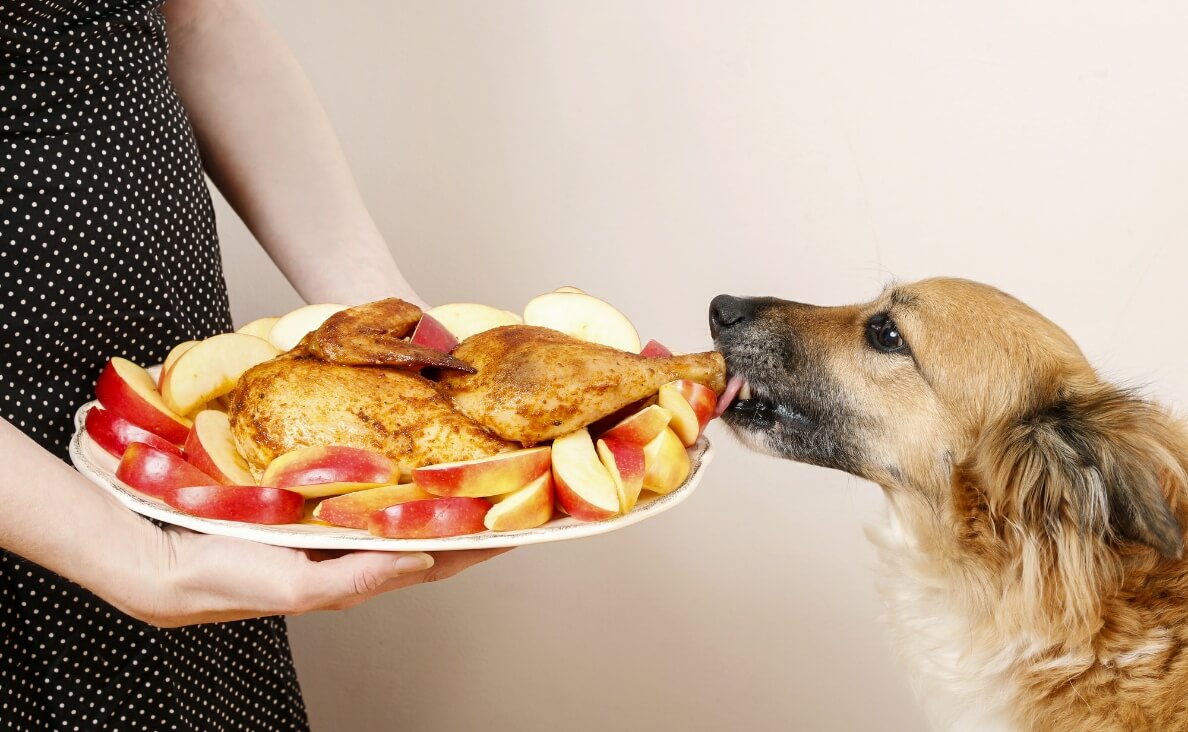
-
Bones and Leftovers
After a big holiday meal, it’s tempting to share some leftovers with your dog, but not all leftovers are safe. Giving your dog bones, especially poultry bones like turkey or chicken, can lead to choking, dental issues, or gastrointestinal blockages. Splintered bones can cause severe injuries to your dog’s mouth and throat, leading to an upset stomach and, in some cases, the need for emergency veterinary care. Instead of bones, consider providing safe and healthy dog treats as an alternative.
-
Alcohol
Alcoholic beverages are a common feature at holiday gatherings, and it’s important to be cautious about where you leave your drink. Dogs can be attracted to the smell and taste of alcohol, and even a small amount can lead to an upset stomach, coordination problems, and, in severe cases, alcohol poisoning. Keep your drinks out of your dog’s reach, and make sure your guests are aware of the potential danger.
-
Grapes and Raisins
Grapes and raisins are often found in fruit salads, baked goods, and as garnishes for holiday dishes. While the exact toxic component is unknown, these fruits can cause kidney failure in dogs. Symptoms of grape and raisin toxicity include vomiting, diarrhea, lethargy, and a decreased appetite. It’s best to keep these fruits away from your dog’s reach and opt for safer alternatives when preparing your holiday meals.
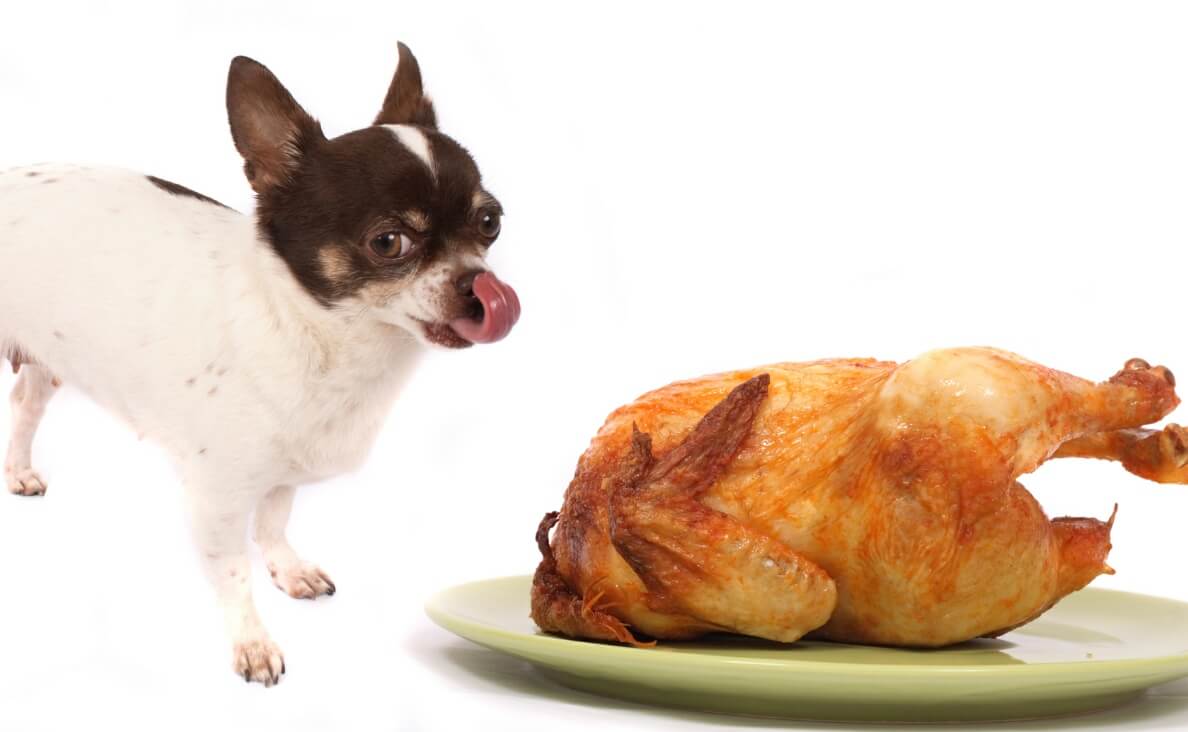
-
Nuts
Nuts are a popular holiday snack, but some varieties, such as macadamia nuts, can be toxic to dogs. Macadamia nuts contain a substance that can lead to weakness, tremors, and an upset stomach in dogs. Additionally, the high-fat content in nuts can exacerbate digestive issues. If you want to enjoy nuts during the holidays, make sure to keep them out of your dog’s reach.
-
Xylitol-Containing Foods
Xylitol is a sugar substitute commonly found in sugar-free gum, candies, and baked goods. It can cause a rapid release of insulin in dogs, leading to a sudden drop in blood sugar, also known as hypoglycemia. Symptoms of xylitol poisoning include vomiting, loss of coordination, seizures, and, in severe cases, liver failure. Always check food labels for xylitol and keep such items out of your dog’s access.
-
Spices and Seasonings
Many holiday dishes are flavored with spices and seasonings that may not agree with your dog’s stomach. Ingredients like nutmeg and cinnamon, commonly used in holiday baking, can be toxic to dogs in large quantities. Excessive consumption of these spices can lead to gastrointestinal upset, disorientation, and even seizures. Be cautious when sharing baked goods with your canine friend and opt for dog-safe treats instead.
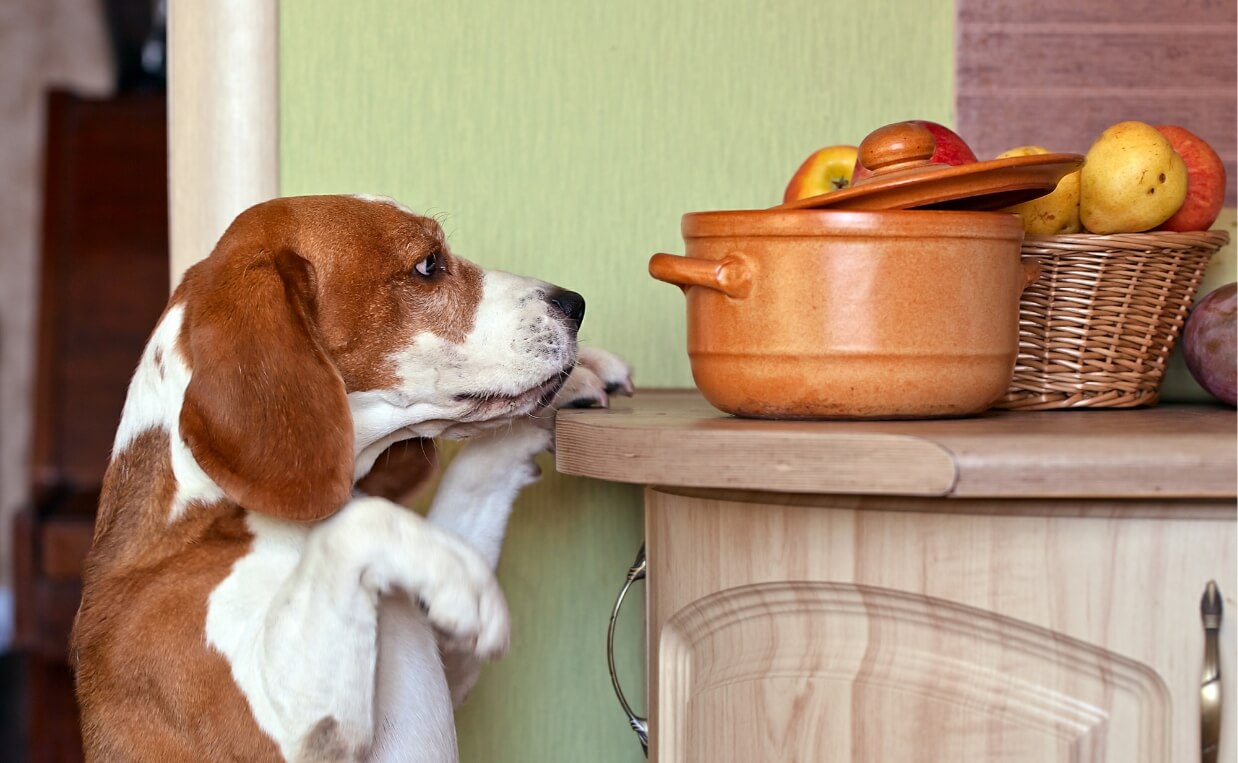
-
Dairy Products
Dairy products, such as eggnog and cheese, are often enjoyed during the holidays. However, many dogs are lactose intolerant, meaning they lack the enzyme necessary to digest lactose, a sugar found in milk and other dairy products. Consuming dairy can result in gastrointestinal distress, including an upset stomach, diarrhea, and gas. If you want to give your dog a special treat, opt for lactose-free options.
Read more: The Ultimate Guide to Foods You Can and Can’t Feed Your Dog
While it’s natural to want to share the joy of the holiday season with your dog, it’s essential to be aware of the potential dangers that certain holiday foods can pose to your furry friend’s stomach and overall health. By avoiding chocolate, onions, garlic, rich and fatty foods, bones, alcohol, grapes, raisins, nuts, xylitol-containing foods, spices, and dairy products, you can ensure that your dog has a safe and healthy holiday season.
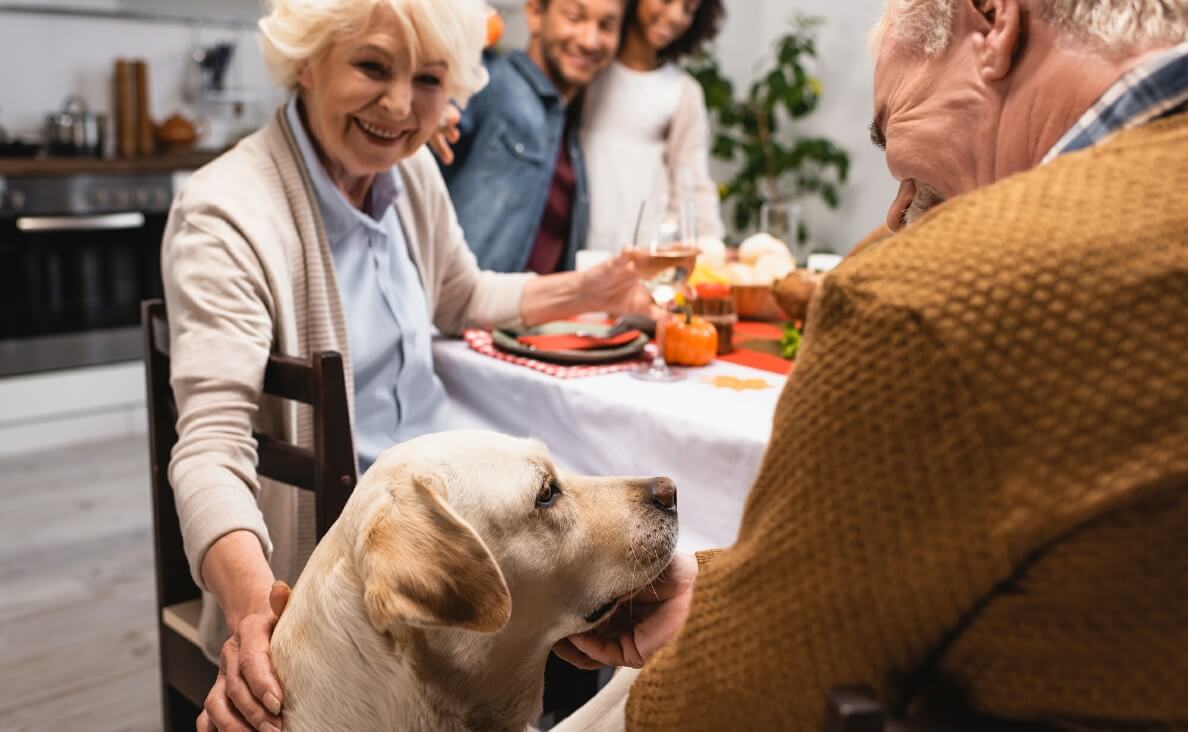
It’s crucial to prioritize your dog’s well-being and make informed choices when it comes to sharing food during the holidays. Remember, your furry companion will appreciate your love and attention more than any holiday treat, so focus on creating safe and joyous memories together.
What food do you think should be added to this list?

 Understanding and Managing Dog Food Sensitivities
Understanding and Managing Dog Food Sensitivities 5 Tips for Preventing Obesity in Your Dog
5 Tips for Preventing Obesity in Your Dog 10 Easy Ways to Improve Your Dog’s Kibble Diet
10 Easy Ways to Improve Your Dog’s Kibble Diet Is Peppermint Safe for Dogs? Everything You Should Know
Is Peppermint Safe for Dogs? Everything You Should Know Healthy Easy Homemade Dog Treats
Healthy Easy Homemade Dog Treats






Leave a Reply